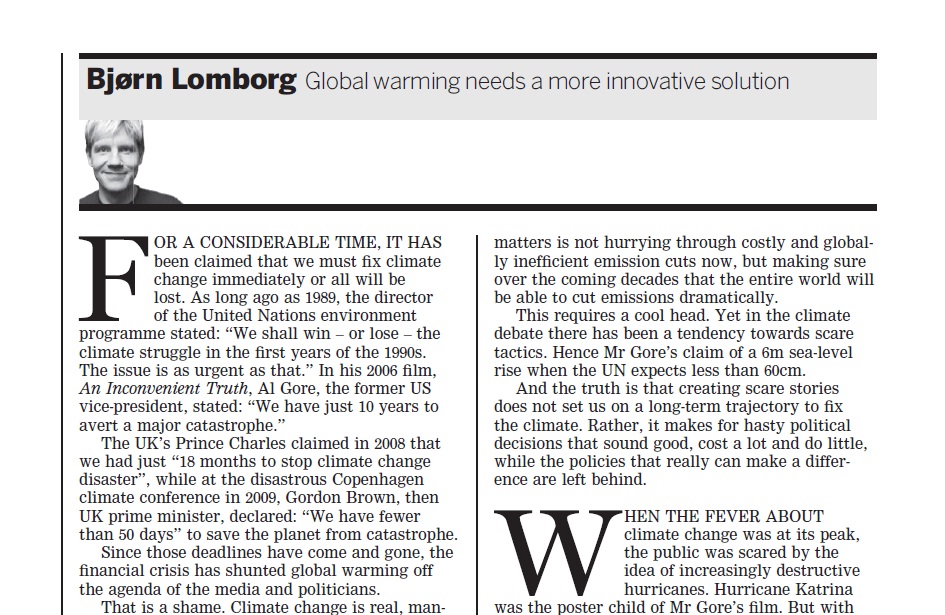Bjorn Lomborg, met wie ik grotendeels op één lijn zit, heeft een steengoede column in een special van de Financial Times over Durban. De portee van zijn verhaal is dat nu drastisch CO2 reduceren wel eens meer kwaad kan doen dan goed:
Ultimately, the solutions of the past decades – those enshrined in the Kyoto Protocol – are expensive ways to do little. The most ambitious climate legislation, under which the European Union seeks to cut emissions to 20 per cent below 1990 levels by 2020, will cost $250bn a year for 80 years, yet shave only 0.05C off the temperature rise at century’s end. The truth is drastic: immediate carbon cuts cost considerably more than they achieve. To put it starkly, they are likely to do a lot more damage than climate change to our quality of life – and, if enforced in the developing world, will be especially damaging.
Lomborg verwijst heel terecht ook naar het werk van Richard Tol:
However, we need to be careful not to do more harm with our “solution”. Global warming is a century-long problem. Most of the impact will have signifi cant, negative effects only in 50-100 years, despite much of the media coverage suggesting dire consequences today. As Richard Tol, a climate economist, has shown, global warming now is benefi cial for the world. Only in 2075 will it become a problem.
Lomborg is een slimme vent. Hij accepteert de bevindingen van het IPCC (niet zijn vakgebied). Hij is daarmee niet een klassieke klimaatscepticus. Hij stelt vervolgens echter dat nu het probleem oplossen veel te duur is omdat zon, wind en dergelijke er niet klaar voor zijn:
Despite all of the optimistic talk about wind, solar, geothermal and other sustainable, noncarbon- emitting energy sources, no alternative is remotely ready to shoulder the energy burden currently borne by fossil fuels. That is why policymakers should significantly boost the amount of money invested in research and development of green energy alternatives.
Ik interviewde hem toen hij zijn boek Cool it! in Nederland kwam promoten. Het interessantste wat hij liet zien was een grafiek in de academische editie van zijn boek waarin te zien is hoeveel landen investeren in energie R&D. Dat blijkt opmerkelijk weinig te zijn. Er was een toename tijdens de oliecrisis, daarna namen de R&D-investeringen weer af en bleven tamelijk constant, ondanks de groeiende populariteit van global warming als mondiaal probleem. Zijn voorstel is daarom simpel, investeer structureel in energie R&D, dat kost je een fractie van wat de opvolger van Kyoto zou gaan kosten en levert ons hopelijk later deze eeuw de technologieën op waarmee we de mondiale economie kunnen gaan decarboniseren:
Devoting just 0.2 per cent of GDP – roughly $100bn a year – to green energy R&D would have a much higher likelihood than our current approach of creating the framework for the kind of game-changing breakthroughs needed to fuel a carbon-free future. If we could find alternatives such as solar panels that are cheaper than fossil fuels over the next two to four decades, everyone would switch and global warming would be fixed.
Ik verschil van mening met Lomborg over de ernst van het probleem. Mijn boek laat diverse bewijzen zien dat het IPCC de zaak overdreven heeft. De ernst van het probleem is dus kleiner dan Lomborg schetst in mijn optiek. Dat betekent dat we waarschijnlijk nog meer tijd hebben dan 2075 om het probleem ‘op te lossen’. De term oplossen vind ik overigens misleidend. Ik ben meer van de Mike Hulme-terminologie dat klimaatverandering een ‘probleem’ is dat we goed moeten managen. Lomborg zegt hier ook niets over adaptatie, iets waar ik zelf wel geld in zou steken omdat het op korte termijn veel rendement zal hebben.


